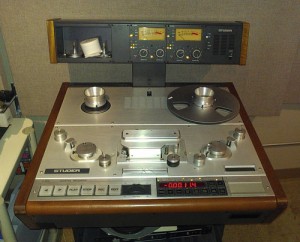 Over the last couple years, I’ve had a remarkable number of projects come through my mastering studio originating on tape. Some of these projects involve restoration on past work of notable artists including the Grateful Dead and Doc Watson, but many are new recordings by artists intrigued by the unique quality of analog sound and recording.
Over the last couple years, I’ve had a remarkable number of projects come through my mastering studio originating on tape. Some of these projects involve restoration on past work of notable artists including the Grateful Dead and Doc Watson, but many are new recordings by artists intrigued by the unique quality of analog sound and recording.
Welcome to a small—but hopefully useful—primer and introduction to analog tape machines. Analog tape is back in vogue, and many are discovering the vibe of this recording format. If you are new to analog recording, or are contemplating purchasing and using an analog recorder, this series is for you!
Before You Buy
Unlike digital workstations like ProTools (which have their own, unique requirements), analog tape decks require ongoing maintenance, cleaning, and alignment for proper operation. Tape decks are mechanical devices full of parts that wear out and/or need periodic adjustment. If you have a tape deck in mind, have it checked out by a knowledgable technician. The tape deck you are considering is 20 years old or older. It’s likely that any tape machine you buy will need some work, so factor that into your budget. These machines haven’t been manufactured for many years, but with proper care, will last a lifetime. Parts that often need work or replacement include:
- motors (there are typically three)
- various bearing found in all rotating parts
- pinch roller
- heads
The heads should be examined by a tape-head expert and relapped if they are worn. Relapping is the recontouring of the head face profile for correct tape to head contact. Tape heads can usually be relapped two, maybe three, times before they need replacement.
Recommended Tape Decks
Analog tape decks: Ampex ATR-100 (2 track) or one of several Studers: A80, A820, A810
Multitrack machines: Studer A80, A800, A820 or A827 or Otari MTR-90
In the Airshow studio, we we work on a Studer A820 and two Ampex ATR 104′s.
Have questions for us or advice for others using tape for the first time?
Leave us a comment, and check back next week for tips on proper tape deck care!
Also see Part 2: How to Keep Your Tape Deck in Top Condition and Part 3: Studio Settings and Collaboration
